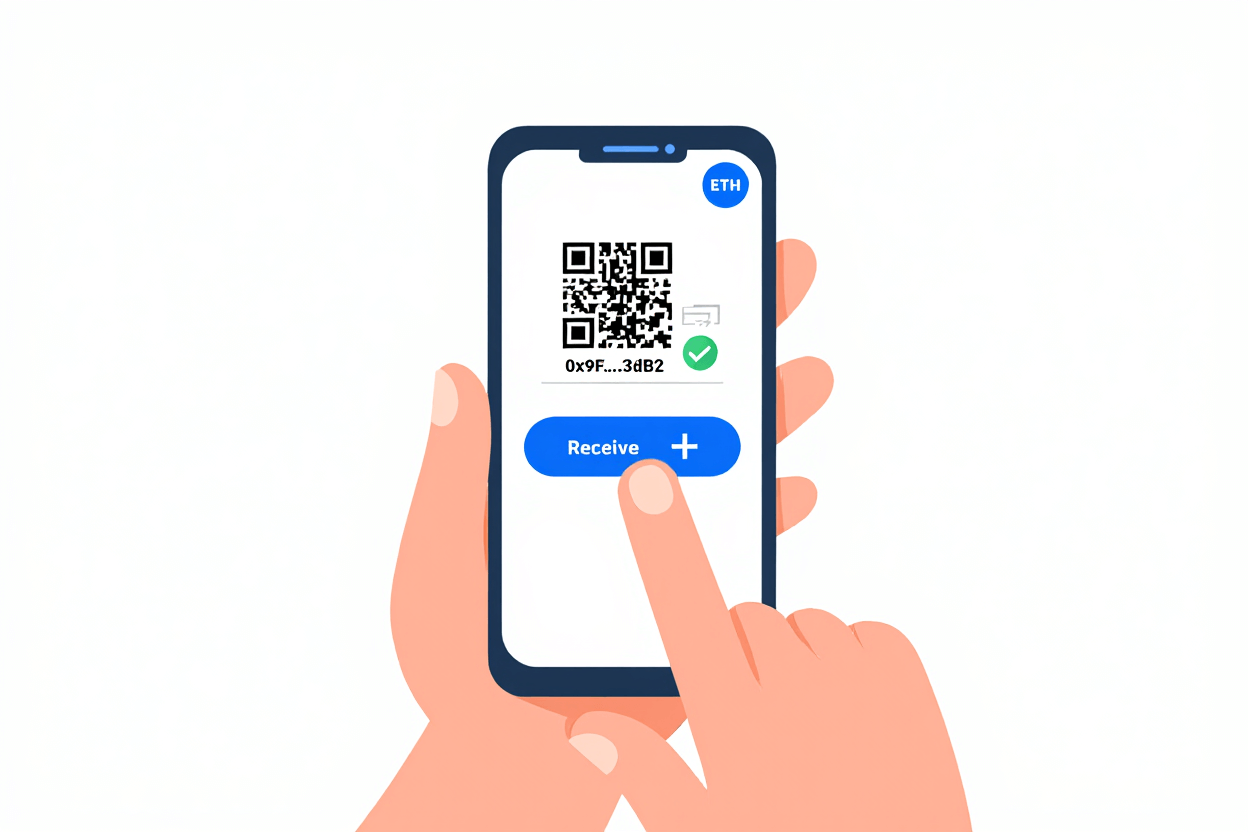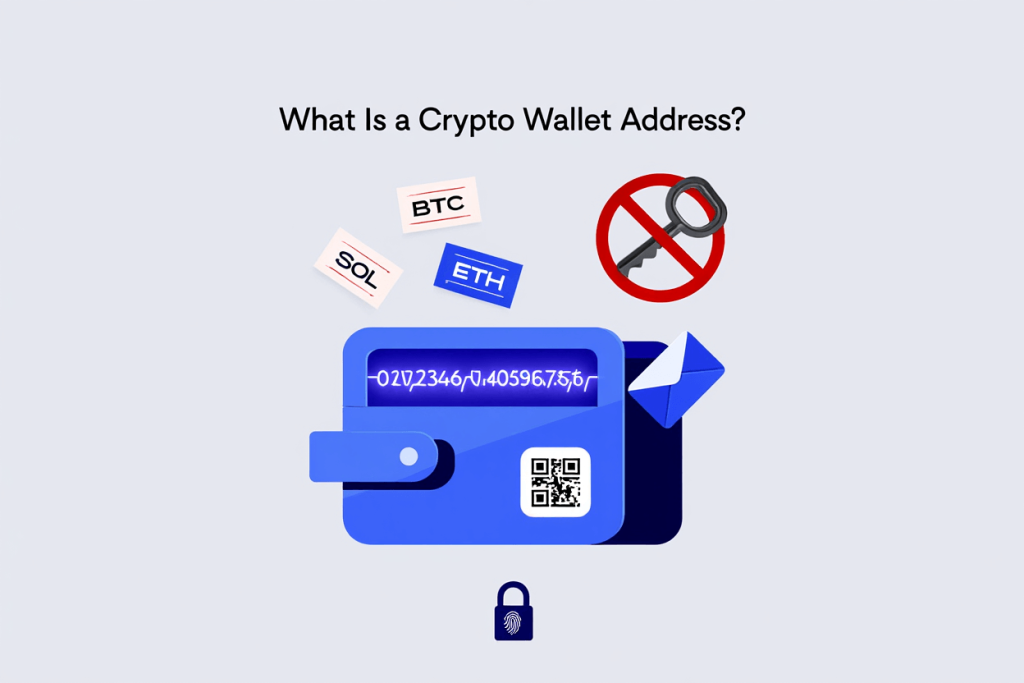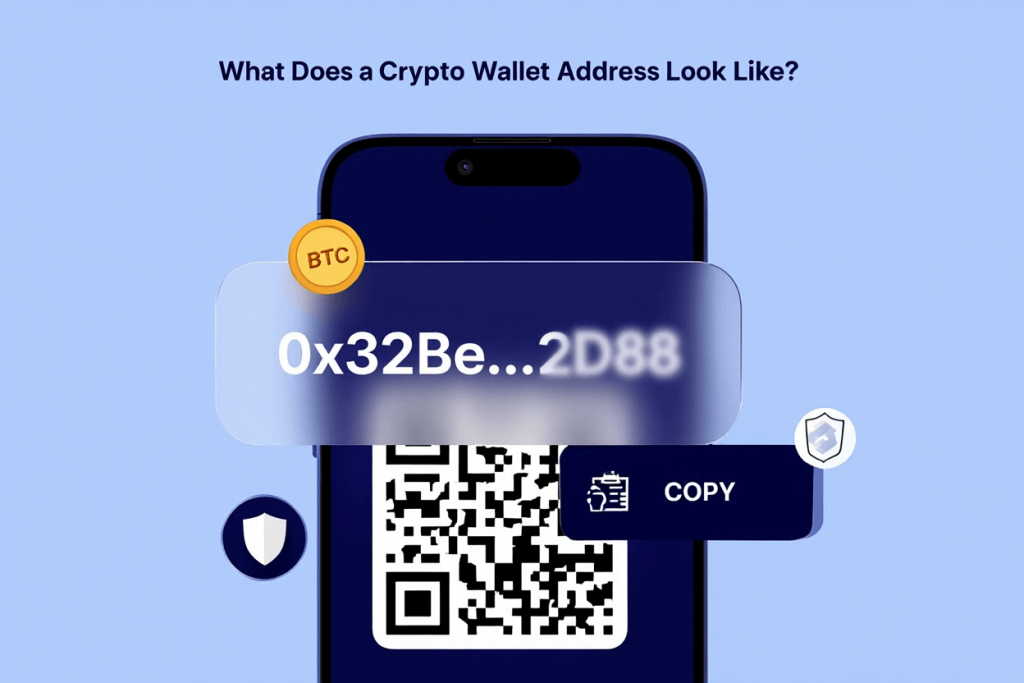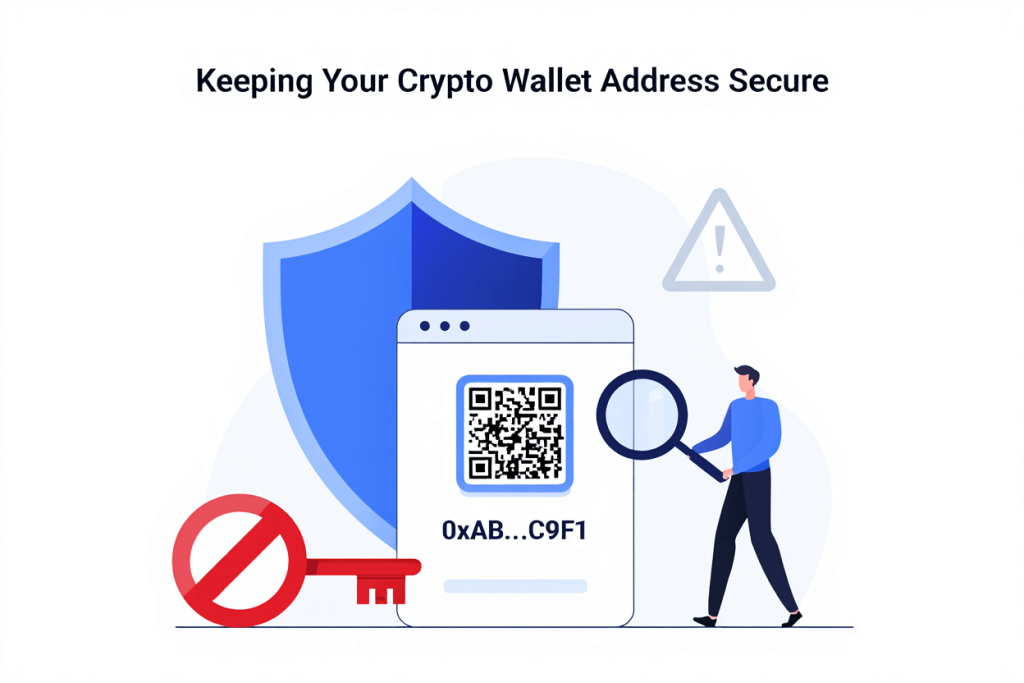Physical Address
304 North Cardinal St.
Dorchester Center, MA 02124
Physical Address
304 North Cardinal St.
Dorchester Center, MA 02124

With crypto evolving fast in 2025, many users ask: How do I know my crypto wallet address? Understanding it is key to securely managing digital assets. A crypto wallet address can be thought of as your personal identifier on the blockchain, much like an email address, but for sending and receiving digital currencies.
For newcomers and experienced holders alike, knowing how to recognize, manage, and protect your wallet address is foundational to safe crypto participation. In this up-to-date guide, you’ll learn the essential steps and best practices to confidently find and use your wallet address, reducing the risk of errors or security mishaps as adoption accelerates. Whether you’re just exploring crypto or already trading on top exchanges, mastering this knowledge is a must for secure and efficient management of digital assets.
A crypto wallet address is a unique string of letters and numbers used to receive cryptocurrencies on blockchains like Bitcoin, Ethereum, and many others. Think of it as the crypto equivalent of a bank account number: you share this address when someone wants to send you funds. Unlike your private keys, your address is public information that tells the network where to send digital assets.

In everyday terms: imagine your wallet address as the blockchain’s equivalent to your email address, share it to receive messages (crypto), but never reveal your password (private key). It’s important to distinguish between a public address (for sharing) and your private key or recovery phrase (never share).
For reference, here are examples (not real):
bc1qxy2kgdygjrsqtzq2n0yrf2493p83kkfjhx0wlh0x12b5b7c1a8e927f4e08e4a1b5ddad0e5b2a7b7f3Next, let’s explore why your wallet address matters and when you’ll use it.
Your wallet address plays a crucial role in nearly every crypto transaction. It acts as a public routing point for digital assets, without it, you couldn’t receive crypto or interact with blockchain services.
Your address is public, unguessable, and critical for crypto activity, but always keep your private information separate.
To explore similar concepts, check our crypto knowledge section for beginner-friendly explanations.
Next: how to find your wallet address, step by step.
Wondering how do I know my crypto wallet address? Whether you use an exchange, mobile app, or hardware wallet, here’s how to find it step-by-step:

Platform-Specific Steps:
| Platform | Steps | Screenshot/Guide | Special Notes |
|---|---|---|---|
| Coinbase | Assets → Select Coin → Receive → Copy/QR | [screenshot] | Double-confirm correct network (esp. with USDT, ETH, etc.) |
| Binance | Wallet → Deposit → Select Coin → Network → Copy Address | [screenshot] | Choose the desired blockchain (e.g., BEP20 vs ERC20) |
| MetaMask | Open App → Tap Account name (displays address) → Copy | [screenshot] | Address used for all EVM (Ethereum) tokens |
| Ledger Live | Accounts → Select Crypto → Receive → Connect Device → Copy Address | [screenshot] | Verify on device screen for security |
| Trust Wallet | Open App → Choose Crypto → Receive → Copy Address/QR | [screenshot] | Supports multi-chain; confirm network |
| Exodus Wallet | Wallet → Select Asset → Receive → Copy QR/Address | [screenshot] | Shows different addresses per asset |
| Kraken | Funding → Deposit → Choose Coin → Generate/Copy Address | [screenshot] | Addresses sometimes rotate for privacy |
| Crypto.com | Accounts → Crypto Wallet → Select Coin → Deposit → Copy | [screenshot] | Network selection critical for certain assets |
| Phantom (Solana) | Open App → Top bar address → Copy icon | [screenshot] | One address for SOL and SPL tokens |
| Atomic Wallet | Wallet → Select Asset → Receive → Copy | [screenshot] | Simple per-coin addresses |
Common Tips: Look for the Receive, Deposit, or wallet account name. Always ensure you’re copying an address from the official app/website. Double-check that the network chosen matches your sending source, sending to an incompatible address or chain could result in lost funds.
Visual examples/screenshots (where applicable) help confirm you’re on the right track. Next, let’s see exactly what different wallet addresses look like and the signs of a valid address.
Crypto wallet addresses can appear intimidating, but once you break them down, they follow clear formats depending on the blockchain.

bc1qxy2kgdygjrsqtzq2n0yrf2493p83kkfjhx0wlh0x12b5b7c1a8e927f4e08e4a1b5ddad0e5b2a7b7f36sTtRk8...dD4Qs2JKey Characteristics:
Validating an Address (at a high level):
Related reads in the crypto category:
Seeing these patterns helps spot mistakes, protect your funds, and recognize fake or phishing addresses. Let’s now address: Should you reuse addresses, or is it safer to rotate them?
In 2025, best practices for address management depend on the blockchain and the level of privacy you need. Some wallets (especially Bitcoin) generate a fresh address for each new transaction, this helps protect your privacy on public blockchains. Others, like most Ethereum wallets, use a single address for all ERC-20 and NFT activity.
| Scenario | Reuse Address? | Generate New? | Notes |
|---|---|---|---|
| Bitcoin (privacy focus) | No | Yes | Each receive creates a new address for privacy |
| Ethereum (tokens/NFTs) | Yes | Rarely | One address stores all assets/Fungibles/NFTs |
| Exchanges | Often rotates | Yes | May change for security/compliance reasons |
| Personal use, small transfers | Often Yes | Depends | Risk is lower with small amounts and trusted parties |
Tips: Review your wallet’s transaction or history tab to find previous addresses and always follow platform guidance. For maximum privacy, especially on transparent chains like Bitcoin, using a new address for each receive is recommended. For ERC-20s, reusing a single address is normal and secure.
Sometimes your wallet address doesn’t show up or something seems off. Here are common issues and fast solutions:
| Problem | Solution | Resource |
|---|---|---|
| Address not visible | Sync wallet, check correct coin/network, update software | Wallet’s help center |
| Old/outdated address copied | Always use fresh address from official app/site; never trust screenshots | App FAQs |
| Wrong blockchain/network | Double-check selected asset/network before copying address | Platform documentation |
| Suspect software bug | Restart app, check for updates, re-import wallet | Official support |
If you’re stuck, visit your wallet or exchange’s official support pages, they’re usually up-to-date and have step-by-step troubleshooting guides. Never share your full wallet screenshots or private keys while seeking help.
Security is everything with digital assets. Here’s a 2025 checklist to keep your wallet addresses, and your funds, safe:

Staying vigilant with these practices ensures your participation in crypto trends 2025 will be safer and more enjoyable. Now, let’s answer some of the most common wallet address questions.
| Platform | Type | Step-by-Step Location | Official Guide/Screenshot | Notes/Tips | Last Verified |
|---|---|---|---|---|---|
| Coinbase | Exchange (web/mobile) | Assets → Select Coin → Receive | Coinbase Help | Network choice for multi-chain tokens | 2025 |
| Binance | Exchange (web/mobile) | Wallet → Deposit → Coin → Network → Copy Address | Binance FAQ | Multi-chain: BEP20/ETH/TRON support | 2025 |
| MetaMask | Hot wallet (web/mobile) | App → Account → Copy | MetaMask Support | One address for all EVM chains | 2025 |
| Trust Wallet | Hot wallet (mobile) | App → Select Asset → Receive | TrustWallet Docs | Multi-chain, easy QR | 2025 |
| Ledger Live | Hardware (desktop/mobile) | Accounts → Select Crypto → Receive | Ledger Help | Verify on device for security | 2025 |
| Exodus | Hot wallet (desktop/mobile) | Portfolio → Asset → Receive | Exodus Support | Distinct address per asset | 2025 |
| Kraken | Exchange (web) | Funding → Deposit → Generate/Copy | Kraken FAQ | Addresses rotate for privacy | 2025 |
| Crypto.com | Exchange (web/app) | Accounts → Deposit → Select Coin | Crypto.com Knowledge Base | Check network (ERC20, TRC20 etc.) | 2025 |
| Phantom | Hot wallet (web/mobile/Solana) | App → Top Address Bar | Phantom Docs | SPL tokens use same address | 2025 |
| Atomic Wallet | Hot wallet (desktop/mobile) | Wallet → Select Coin → Receive | Atomic Wallet FAQ | Direct coin receive section | 2025 |
| BitPay | Hot wallet (mobile)/payment | Wallet → Asset → Receive | BitPay Help Center | Mostly Bitcoin, also Ethereum | 2025 |
| SafePal | Hardware/mobile hybrid | App → Asset → Receive | SafePal Docs | Multi-chain, hardware sign-off | 2025 |
| Trezor Suite | Hardware (desktop/web) | Accounts → Coin → Receive → Confirm on device | Trezor Support | Verify on device always | 2025 |
| Guarda | Hot wallet (web/desktop/mac/mobile) | Assets → Select Coin → Receive | Guarda FAQ | Multiple formats, easy UI | 2025 |
| Concept | Purpose | Example Format | Safe to Share? |
|---|---|---|---|
| Wallet Address | Receive crypto; acts as public account | 0x12b5…b7f3 | Yes |
| Public Key | Technical lock unlocks address via private key; rarely shown | 04fb2a…89cdc | No (but usually not dangerous) |
| Private Key | Proof of ownership; grants access/spending | e331b6…9aaf2 | No, NEVER |
| Recovery Phrase | Master backup to restore wallet/keys | 12 or 24 English words | No, NEVER |
In short: Share your wallet address; keep all other keys, passwords, or seed phrases strictly private.
Whether you’re a beginner diving into crypto for the first time or a seasoned user following the latest crypto trends in 2025, understanding your crypto wallet address is foundational to safely sending, receiving, and storing digital assets. Knowing the difference between an address, public key, private key, and recovery phrase, and how to find and validate your address across platforms, empowers you to navigate the blockchain world securely. Always follow best practices, stay vigilant against scams, and check official guides for troubleshooting. With these insights and tools in hand, you’re prepared to participate safely and confidently in the fast-evolving Web3 ecosystem.
Web Tai Chinh is a portal that updates news and information related to finance quickly and accurately, helping users have an overview before investing, clearly understanding concepts and terms related to Finance.
📞 Contact: 055 937 9204
✉️ Email: webtaichinh@gmail.com
📍 Address: 13 Ho Tung Mau, An Binh, Di An, Binh Duong